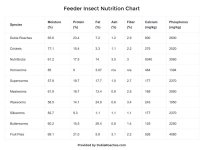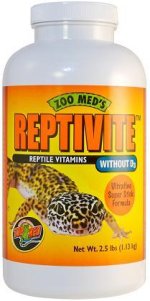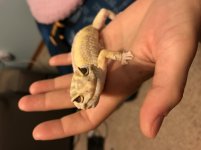My 10-year old leopard gecko, Hermie, is currently under treatment for kidney failure/gout and the presence of an infection. I just gave him his last dose of antibiotic this morning (a 10-day treatment). He is continuing his daily doses of allopurinol.
Four days ago, I saw the first signs that he was going to shed. Usually it takes 24-48 hours for my geckos to show initial signs of a shed through to being completely done with it.
This is the fourth day, and Hermie's skin does not yet look ready to come off, and aside from a little bit of rubbing around the tank items yesterday, he has not started trying to get it off. I have soaked him in shallow warm water a couple of times in the past four days, but i have mostly been trying to leave him alone (aside from giving medications).
I have included some pictures of what he has looked like over the past few days. His head took the longest to go whitish, but still nowhere near the looks-like-he's-wearing-pajamas type of skin that's ready to come off. It's started to crack and peel away at his legs, which were the first to show signs of shedding. His underbelly is leathery. I have tried pulling gently on some of the areas that cracked, and it was not super easy to come off, so I left it alone.
He has spent SO MUCH time in his humid hide over the past four days (he's in there right now), so humidity is definitely not the issue. I'm wondering if this is normal for a gecko who is not feeling well or on medication, and at what point I should intervene?
Tank info:
20-gallon long, paper towels as substrate, lives alone
Heat pad on warm side (variety of sheltered places to hide ranging from 85-95 degrees F depending on where I shoot with my temp gun and how warm the room is) Cool side around 68-70 F
Humid hide is tupperware container with moist paper towel. It is in the middle of his tank between the hot and cold sides, but since he was undergoing antibiotic treatment, I put a USB-powered low-heat mat under the humid hide to keep it from getting cold. So the humid hide is not toasty, but it's not cold.
He has an Arcadio Shade-dweller UVB lamp and eats dubia roaches.
My main questions are if anyone else has observed this type of drawn-out shedding process for their geckos who are sick, and at what point should I try to help him start getting the shed off?
Thanks!
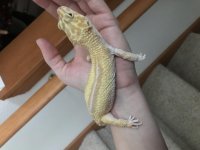
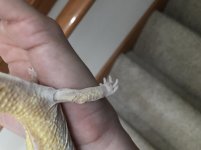
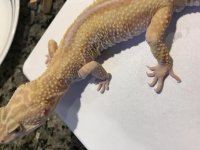
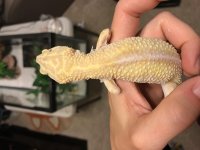
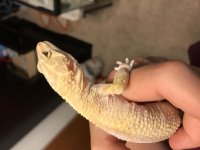
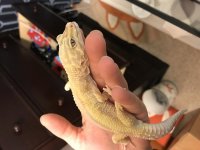
Four days ago, I saw the first signs that he was going to shed. Usually it takes 24-48 hours for my geckos to show initial signs of a shed through to being completely done with it.
This is the fourth day, and Hermie's skin does not yet look ready to come off, and aside from a little bit of rubbing around the tank items yesterday, he has not started trying to get it off. I have soaked him in shallow warm water a couple of times in the past four days, but i have mostly been trying to leave him alone (aside from giving medications).
I have included some pictures of what he has looked like over the past few days. His head took the longest to go whitish, but still nowhere near the looks-like-he's-wearing-pajamas type of skin that's ready to come off. It's started to crack and peel away at his legs, which were the first to show signs of shedding. His underbelly is leathery. I have tried pulling gently on some of the areas that cracked, and it was not super easy to come off, so I left it alone.
He has spent SO MUCH time in his humid hide over the past four days (he's in there right now), so humidity is definitely not the issue. I'm wondering if this is normal for a gecko who is not feeling well or on medication, and at what point I should intervene?
Tank info:
20-gallon long, paper towels as substrate, lives alone
Heat pad on warm side (variety of sheltered places to hide ranging from 85-95 degrees F depending on where I shoot with my temp gun and how warm the room is) Cool side around 68-70 F
Humid hide is tupperware container with moist paper towel. It is in the middle of his tank between the hot and cold sides, but since he was undergoing antibiotic treatment, I put a USB-powered low-heat mat under the humid hide to keep it from getting cold. So the humid hide is not toasty, but it's not cold.
He has an Arcadio Shade-dweller UVB lamp and eats dubia roaches.
My main questions are if anyone else has observed this type of drawn-out shedding process for their geckos who are sick, and at what point should I try to help him start getting the shed off?
Thanks!








